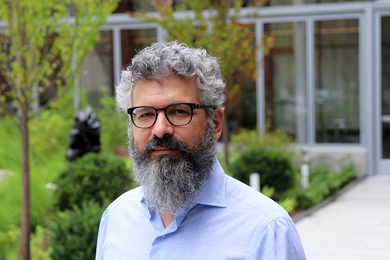MIT Medical will soon start 15 different therapy, support and discussion groups, including groups for graduate students, undergraduates, members of the Class of 2003, gay men graduate students, women, employees, Asian women, black women and Latinas.
Other groups will focus on specific issues like struggling with weight, obsessive-compulsive behaviors, relationship and work issues, coming out, dealing with a crisis or alcohol.
More information on group therapy, answers to frequently asked questions and detailed information on each group is available online or by calling MIT Medical's Mental Health Service at 253-2916.
The therapy, support and discussion groups are part of the Mental Health Service's increasing emphasis on outreach to the MIT community. Nearly half the groups are new this year.
Psychologist Suze Prudent, coordinator of group therapy at the Mental Health Service, said most people who seek the help of a mental health professional envision meeting in complete privacy with one person who has extensive training in mental health.
"When presented with the idea of group therapy, people are often, understandably, put off. But research shows that both individual and group therapy can be useful in dealing with a wide variety of concerns," she said.
"I believe group therapy is a powerful medium for personal exploration and personal change," she said. "Groups provide an opportunity for interpersonal learning - feedback from real people in real time."
Most of MIT Medical's groups start the week of Sept. 30, and most (but not all) require an initial interview with the group leader to match an individual's needs with the goals of the group.
In addition to the groups offered by MIT Medical, the Mental Health Service clinicians can refer students and employees to other on-campus groups, such as cancer support or substance abuse groups, or recommend other groups or group therapists in the Boston area for particular needs. Mental Health also welcomes suggestions for additional on-campus groups when resources permit.
"So much of our develop- ment happens in a group context - the family, the classroom, informal peer groups," Prudent said. "Yet people usually think of therapy only as speaking to a trained professional, one on one." She hopes to change this perception by raising awareness of the way group therapy works and how helpful it can be.
Prudent said that task is made more difficult by the way the media have portrayed therapy groups. "For example, 'The Bob Newhart Show' reinforced some of our worst fears about group therapy," she said. "Members of Bob's group always seemed to be going after each other, making group therapy seem like a kind of free-for-all for expressing hostility.
"Nothing could be further from the truth," she emphasized. "In reality, the group leader assumes the responsibility of ensuring that the group is a safe space where people can talk to each other respectfully and confidentially."
Prudent pointed out other common myths and fears.
"People often hesitate to join a therapy group because they think it means being responsible for other people's mental health," she said. "They may feel burdened by the idea of providing support for other people when they feel in need of help themselves."
People often worry that they will be overwhelmed by the problems of other people in the group - that if they are depressed, for example, the group will make them even more depressed. However, "I have never seen this happen," Prudent said. "Rather, over time, group members begin to see that they are all different in some ways. At the same time, they come to understand that they also share many things in common with others - a realization that lessens the sense of shame and isolation."
Another common fear is that joining a group will put people in a position where they'll have to talk when they don't feel like talking or, as Prudent put it, that they will have to "confess" - talk about things they aren't ready to talk about.
The truth is that talking isn't always the point of group therapy. "People share when they're ready," Prudent said. "In the meantime, they often find they can learn a lot from hearing others talk."
It's also important for people to know that confidentiality is an important part of agreeing to be in a group, she added.
"Groups decrease isolation. They provide a consistent, predictable network of peers, where members know they are safe to bring themselves no matter what else is happening."
In groups, people don't just learn about themselves; they also learn how relationships work, Prudent said. "When you take a risk to reveal something about yourself, it's very powerful to feel accepted by regular people - not just a professional trained to react that way. As a therapist, it's especially moving to observe how quickly people in a therapy group develop this level of caring and respect for each other."
Most of these MIT Medical-sponsored groups are free for currently registered MIT students (including student spouses who purchase the MIT Student Health Plan) or current Traditional or Flexible MIT Health Plan members. Most other current members of the MIT community would be billed if their health insurance doesn't cover the service.
A version of this article appeared in MIT Tech Talk on September 18, 2002.






